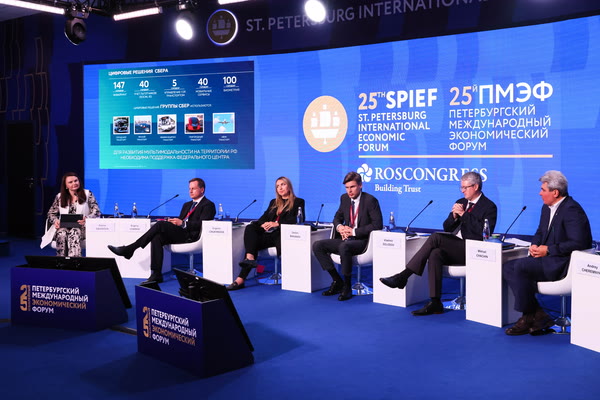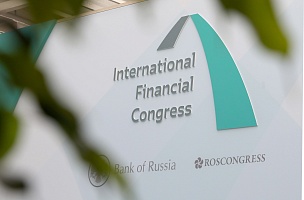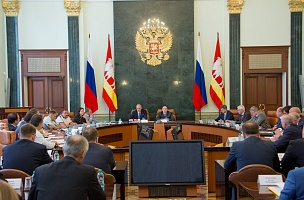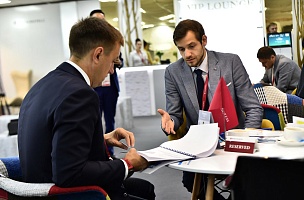Key findings
Digital services have become an integral part of personal logistics
"Digital services have become an integral part of transport. Over the past year, as a government agency, we have developed a standard of transport services. We have added cashless payment to it. Now, 147 cities can pay for transportation by card, and more than 40 entities use a card on the Troika base", said Dmitry Bakanov, Deputy Minister of Transport of the Russian Federation.
"Among our main focuses is the digitalization of services and multimodal opportunities for passengers. We launched the 'Travel with Russian Railways’ service. There were prerequisites for this, including the level of digitalization of interaction with passengers. This year it reached 70 per cent. Now the average monthly traffic to our portal is about 150,000 people”, said Evgeny Charkin, Deputy General Director of Russian Railways.
"Aeroflot is a leader in digitalization, and currently around 50% of check-ins are done electronically. More than 90% of tickets on Aeroflot's website and agents' websites are sold electronically. I think that by the end of the year, passengers will have access to automatic refunds on subsidized flights", said Anton Matskevich, Deputy CEO of Aeroflot.
PROBLEMS
Lack of common standards and service
"Historically, everyone has used a variety of standards. We have all learned to make cashless payments quickly and properly. You can do it on all modes of transport. The question of standards has now arisen. How can all these developments be brought together into a single space and not violate the regulations that are in place for transport? The market lacks a standard for the development of multimodality", said Mikhail Chachin, Vice President of Sberbank.
"The future lies in the integration of different platforms. It is important to us that there is no inefficient mixing of all services in a single mobile app, as efficiency can be lost”, said Evgeny Charkin, Deputy General Director of Russian Railways.
Non-standard conditions in individual regions
"Transport is our biggest challenge. We have one of the most extensive uses of air transport. A large part of the territory is only reachable from the air. Most parts do not have airports, and accordingly, we use helicopters rather than planes. Because of the weather, regular flights are often not feasible, as delays can last for days or even weeks without any fault on the part of the carrier. This should not be a barrier to digitalization. We should create such a service so that a tourist feels at home in Kamchatka and a resident of Kamchatka feels at home in Moscow", said Vladimir Solodov, Governor of Kamchatka Territory.
Ethical issues
"A car can already be driven without a driver. From our point of view, this is an ethical problem. There is no one to punish in case something goes wrong. And there is a stalemate. What will happen is unclear. And this is a global problem connected to the development of neural networks. The whole world is living in this dilemma”, said Mikhail Chachin, Vice President of Sberbank.
SOLUTIONS
Understanding citizen requests and digitalization of feedback
"There is a need to understand the demand and the changes we are seeing. We need to move away from paper forms of communication with tourists to the digital space. Now, transport should be sufficient and value for money”, said Evgeniya Chukhnova, Deputy Head of Rostourism.
"User feedback is very important to us. There is an opportunity to give feedback all the time, and we are constantly improving. We use the same in our applications”, said Evgeny Charkin, Deputy General Director of Russian Railways.
"In the Moscow region, we are testing a service to provide rides. You can place a request the day before and you can be sure that the next morning, passengers will be transported to the station in Moscow. This could definitely be available everywhere within two years. We need to move forward and impact the regions at the expense of the federal centre”, said Andrey Cheremnykh, General Director of Urban Mobility.
Product standardization
“On a transport ticket, you can add a tour service, or you can add transport to a tour service where the service is the primary thing. For example, if a small hotel or operator that deals with water excursions wants to do a basic excursion and deliver a standardized transport service, it has great difficulties. If we talk about digital services in tourism, the most important thing for us is to assemble them into a marketplace and move away from tailor-made services. I think this is one of the main tasks", said Vladimir Solodov, Governor of Kamchatka Territory.
"We are seeing a trend towards waterborne transport, to shoring platforms, and to the possibility of the flexible booking of transfers and services to take tourists to places of experience. All this needs to be put together in a unified space. The connection to that should be available to all business players”, said deputy head of Rostourism Evgeniya Chukhnova.
Read more in the Roscongress Information and Analytical System www.roscongress.org






